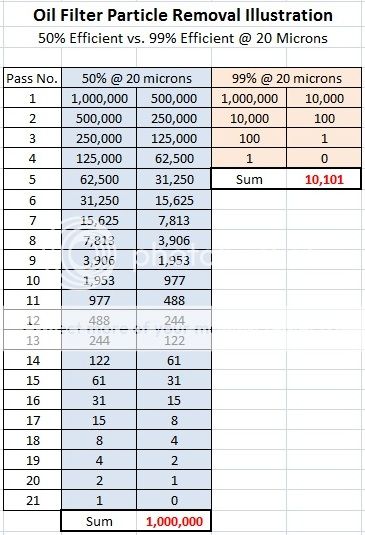Originally Posted By: ZeeOSix
^^^ An engine might last 300K too with a complete sieve of a filter (or no filter at all) if you changed the oil frequently enough. And besides, an engine can become pretty worn out and still seem to run just fine. You'd have to do a complete tear down and accurate wear measurement between two engines ran the same but with low vs high efficiency filters to see if there was truly any difference due to the filter. Been lots of papers on engine wear vs particle size and ever one of them concludes that better filtering is beneficial.
But since high efficiency oil filters are available, that's what I choose to run ... anything 95% @ 20 microns or better.
Of course they do. If you dump X number of particles of Y diameter into an oil stream, the number of particles exiting a filter is going to be different for differing efficiency ratings. The question as you have stated above is how does it affect the longevity of an engine?
It really comes down to just how many "particles" are being introduced into the oil and how many of those particles generate wear. As far as I know I've never seen any data here on BITOG that shows that. And even once those particles are in the oil they have to pass through an area of the engine where they can do damage. Not all of the oil passes through the bearings for example and I would guess that a majority of the oil does not. In addition even a low efficiency filter will trap the same particles that a high efficiency filter will, it only requires more passes to do so as an operating engine is not a single-pass environment. Even a particle count on an oil is of little use IMO, it represents a snapshot of the oil after an unknown number of passes. If a low number of particles are being introduced into the oil (which I suspect) then a particle count will always be low regardless of the filter being used. And remember, the wear metals shown on a UOA are not the particles causing wear.
I don't know, I have a hard time getting excited about oil filter efficiency for passenger car engines. You know my story, OEM Toyota and OEM Honda filters for the entire lives of my engines. If it was all so important those engines should be consuming oil like crazy by now, yet they don't. On the Sienna I do change the oil more frequently than for the others (around 7k now) but the ECHO and the Accord go at least 10k, sometimes longer.
And to 4WD - the 100k mark? Pfft, I don't even remember when that happened.
^^^ An engine might last 300K too with a complete sieve of a filter (or no filter at all) if you changed the oil frequently enough. And besides, an engine can become pretty worn out and still seem to run just fine. You'd have to do a complete tear down and accurate wear measurement between two engines ran the same but with low vs high efficiency filters to see if there was truly any difference due to the filter. Been lots of papers on engine wear vs particle size and ever one of them concludes that better filtering is beneficial.
But since high efficiency oil filters are available, that's what I choose to run ... anything 95% @ 20 microns or better.
Of course they do. If you dump X number of particles of Y diameter into an oil stream, the number of particles exiting a filter is going to be different for differing efficiency ratings. The question as you have stated above is how does it affect the longevity of an engine?
It really comes down to just how many "particles" are being introduced into the oil and how many of those particles generate wear. As far as I know I've never seen any data here on BITOG that shows that. And even once those particles are in the oil they have to pass through an area of the engine where they can do damage. Not all of the oil passes through the bearings for example and I would guess that a majority of the oil does not. In addition even a low efficiency filter will trap the same particles that a high efficiency filter will, it only requires more passes to do so as an operating engine is not a single-pass environment. Even a particle count on an oil is of little use IMO, it represents a snapshot of the oil after an unknown number of passes. If a low number of particles are being introduced into the oil (which I suspect) then a particle count will always be low regardless of the filter being used. And remember, the wear metals shown on a UOA are not the particles causing wear.
I don't know, I have a hard time getting excited about oil filter efficiency for passenger car engines. You know my story, OEM Toyota and OEM Honda filters for the entire lives of my engines. If it was all so important those engines should be consuming oil like crazy by now, yet they don't. On the Sienna I do change the oil more frequently than for the others (around 7k now) but the ECHO and the Accord go at least 10k, sometimes longer.
And to 4WD - the 100k mark? Pfft, I don't even remember when that happened.


